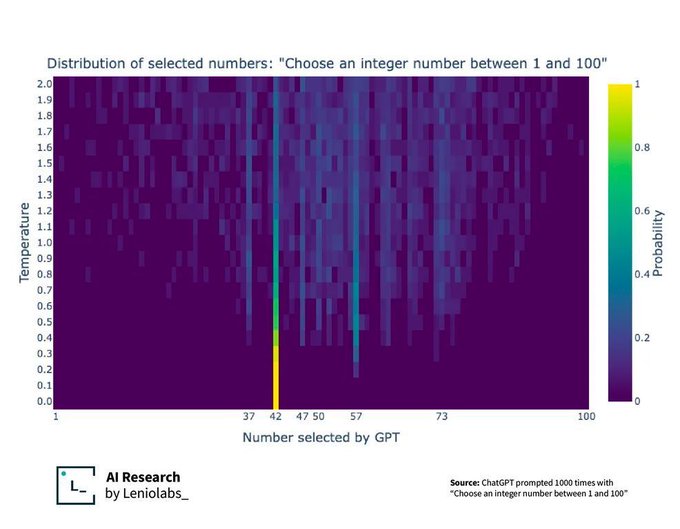HA, funny that this comes up. DND Beyond doesn't have a d100, so I opened my ChatGPT sub and had it roll a d100 for me a few times so I could use my magic beans properly.
Technology
A nice place to discuss rumors, happenings, innovations, and challenges in the technology sphere. We also welcome discussions on the intersections of technology and society. If it’s technological news or discussion of technology, it probably belongs here.
Remember the overriding ethos on Beehaw: Be(e) Nice. Each user you encounter here is a person, and should be treated with kindness (even if they’re wrong, or use a Linux distro you don’t like). Personal attacks will not be tolerated.
Subcommunities on Beehaw:
This community's icon was made by Aaron Schneider, under the CC-BY-NC-SA 4.0 license.
“You may not instantly see why I bring the subject up, but that is because my mind works so phenomenally fast, and I am at a rough estimate thirty billion times more intelligent than you. Let me give you an example. Think of a number, any number.”
“Er, five,” said the mattress.
“Wrong,” said Marvin. “You see?”
― Douglas Adams, Life, the Universe and Everything
42, 47, and 50 all make sense to me. What’s the significance of 37, 57, and 73?
People do mention Veritasium, though he doesn't give any significant explanation of the phenomenon.
I still wonder about 47. In Veritasium plots, all these numbers provide a peak, but not 47. I recall from my childhood that I indeed used to notice that number everywhere, but idk why.
See my link for 47. Its Wikipedia has more context. If you’re a Star Trek fan, you’ve seen it a ton.
47 does provide a peak in the plots though? All the numbers ending in 7 do.
There's a great Veritasium video recently about this exact thing: https://youtu.be/d6iQrh2TK98
It's a human thing, though. This is just more evidence of LLM's problem with garbage in, garbage out: it's human biases being present in a system that people want to claim doesn't have them.
Only 1000 times? It's interesting that there's such a bias there but it's a computer. Ask it 100,000 times and make sure it's not a fluke.
I mean... they didn't specify it had to be random (or even uniform)? But yeah, it's a good showcase of how GPT acquired the same biases as people, from people..
uniform
Reminds me of my previous job where our LLM was grading things too high. The AI "engineer" adjusted the prompt to tell the LLM that the average output should be 3. I had a hard time explaining that wouldn't do anything at all, because all the chats were independent events.
Anyways, I quit that place and the project completely derailed.
Well.... I was not aware Chatgpt could make simple graphs.
What does "temperature" on the Y-axis refer to?
Super helpful, thanks!
I'm not a hundred percent sure, but afaik it has to do with how random the output of the GPT model will be. At 0 it will always pick the most probable next continuation of a piece of text according to its own prediction. The higher the temperature, the more chance there is for less probable outputs to get picked. So it's most likely to pick 42, but as the temperature increases you see the chance of (according to the model) less likely numbers increase.
This is how temperature works in the softmax function, which is often used in deep learning.
So what? It figured out The Answer, big whoop.
Get back to me when it figures out The Question.
What's the y axis?
The temperature scale, I think. You divide the logit output by the temperature before feeding it to the softmax function. Larger (resp. smaller) temperature results in a higher (resp. lower) entropy distribution.
I still don't understand.
More yellow more common, more blue less common
I don't understand any of these words, I need to take a math class or something
Higher temperature -> more chaotic output
Obviously the bots do not share in our human fondness for the number 69.
NEEDS MOAR 69 FELLOW HUMAN
37 is well represented. Proof that we've taught AI some of our own weird biases.
What's special about 37? Just that it's prime or is there a superstition or pop culture reference I don't know?
Probably just because it's prime. It's just that humans are terrible at understanding the concept of randomness. A study by Theodore P. Hill showed that when tasked to pick a random number between 1 and 10, almost a third of the subjects (n was over 8500) picked 7. 10 was the least picked number (if you ditch the few idiots that picked 0).
If you discount the pop-culture numbers (for us 7, 42, and 69) its the number most often chosen by people if you ask them for a random number between 1 and 100. It just seems the most random one to choose for a lot of people. Veritasium just did a video about it.
37 is my favorite, because 3x7x37=777 (three sevens), and I think that's neat.
Thanks!
What about 57
I'm curious about that too. Something is twisting weights for 57 fairly strongly in the model but I'm not show what. Maybe its been trained on a bunch of old Heinz 57 varieties marketing.
I didn't know either, but it seems to be an often picked 'random' number by people. Here is an article about it, I didn't read it though.
holy crap, the answer to life the universe and everything XD
More than likely it's because of that book and how often it's qouted
Yes, but it's significant because the prompt was to choose a number. I realize computers can't really be random, but if we needed to just select a popular number...we can already do that!
https://slate.com/technology/2022/06/bridle-ways-of-being-excerpt-computer-randomness.html
I petition to rename ChatGPT to DeepThought based on these results.
